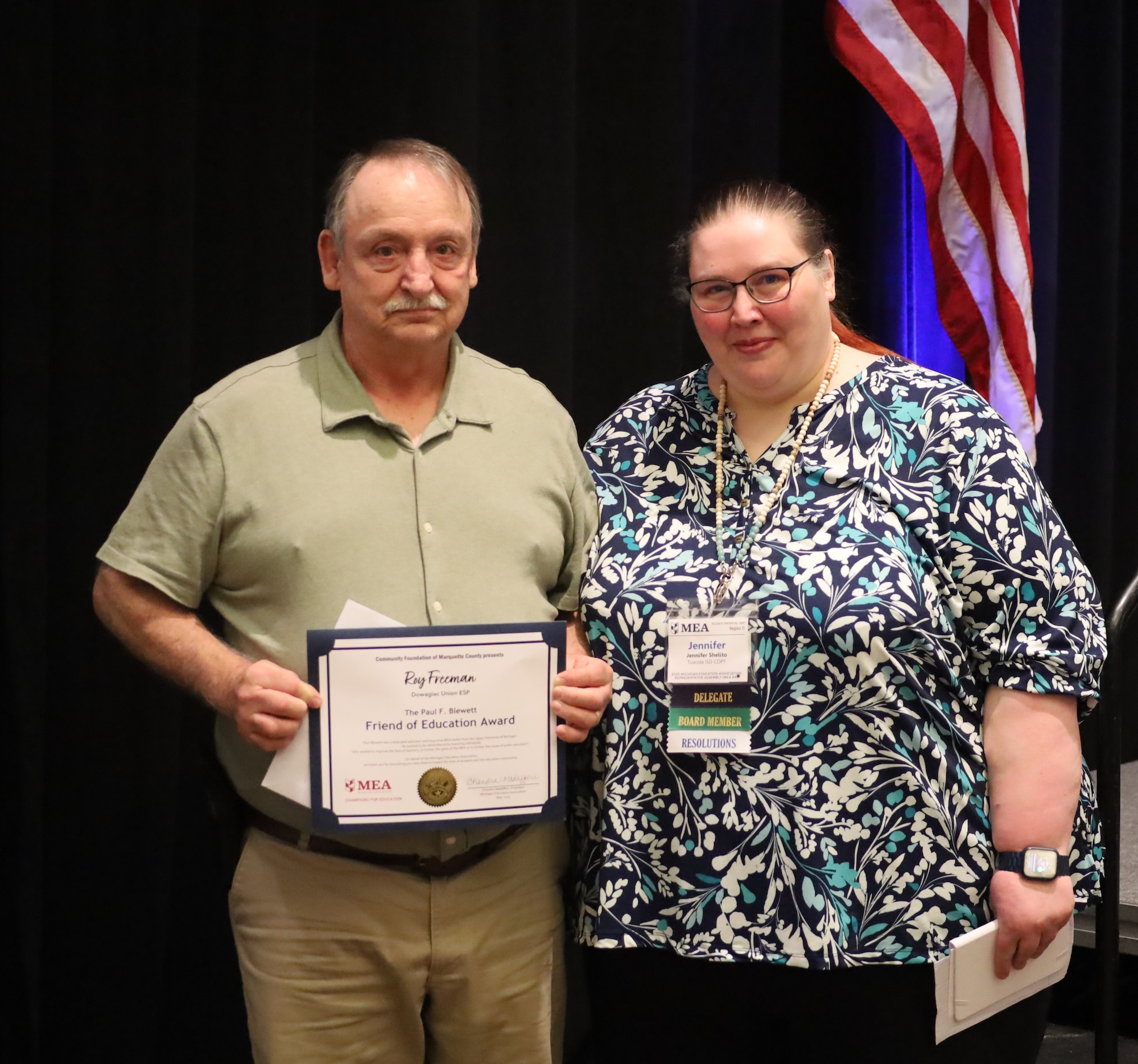School custodian, leader views Bill of Rights as mission: ‘We need to help working people’

By Brenda Ortega
MEA Voice Editor
In the early 1980s, when Roy Freeman first became a school custodian following a post-high school stint in the U.S. Navy, strong health benefits kept him on stable footing when his newborn child spent time in neonatal intensive care.
But over a long career Freeman has seen pay and benefits erode for education support professionals (ESP) as education funding lagged in Michigan and politicians pushed anti-union legislation alongside policies promoting school privatization.
Today the Dowagiac custodian is at the helm as a statewide movement gets underway to right the ship — called the MEA ESP Bill of Rights campaign. A 40-year union member and longtime local leader, Freeman has been a director on the MEA board for 15 years and has chaired the ESP Caucus since 2018.
“We need legislation that helps working people so they don’t have to work two and three jobs to support a family,” he said. “It comes down to respecting us as individuals and the jobs we do. We are the backbone of the schools, which could not operate without us.”
For his tireless work on behalf of school support staff of every stripe, Freeman was honored with MEA’s Paul Blewett Friend of Education Award in May.
MEA Southern Zone and ESP Director Gezelle Oliver said Freeman has been a passionate advocate for education support professionals. “He aims to not only make their work life better but their whole life better,” she said.
The Bill of Rights campaign has become his end-of-career life’s mission, because he knows from experience that advancing the pay and conditions of lower-paid workers instead of managers or billionaires is the rising tide that can lift all boats.
“One of the things that is very important is we’ve got to look beyond a living wage to a thriving wage,” he said. “With a thriving wage, we don’t just work to try and pay bills. We work to raise our family and be able to do things together. That’s what everybody wants.”
For educators from every job classification in public schools, it’s all about helping students learn, grow and succeed, he said. “We have to take care of the everyday person who puts their life out there to do what’s needed for the children.”
From the start of his career Freeman has focused on getting to know students and checking up on those who are struggling. Early on, coaching football and basketball helped him to build bonds. Now it’s one-on-one conversations.
“They know they always have someone they can talk to that cares,” he said.
Support staff see students from different perspectives and deliver invaluable input and assistance in young people’s development. “Watching the students take steps forward is what makes it worthwhile to come to work. It’s one of the rewards of doing a good job.”
Yet over the past 20 years, privatization has placed downward pressure not only on compensation but also respect for ESP contributions within the school community, he said. His role in the ongoing fight to defeat privatization efforts drew him deeper into unionism.
Freeman didn’t grow up in a union household, but he rose quickly to leadership in his local by recognizing the power of collective action. Through trainings, conferences and networking, he developed leadership skills first cultivated as a platoon leader in the military.
He learned everything he could from two ESP leaders now retired and both inducted into the MEA ESP Hall of Fame: Connie Boylan, a library media paraprofessional in Traverse City schools, and Drew Campbell, a Waterford custodian.
Boylan and Campbell led the Statewide Anti-Privatization (SWAP) cadre which offered training and support to ESP units across Michigan and the U.S.
When his own district tried to outsource custodial jobs in 2007, Freeman gathered information, mobilized his members, and engaged the teachers’ union to help. He pulled data from places where privatization had occurred to show the steep cost in reduced services and high turnover.
“We did surveys, held countless discussions, and packed board meetings,” he said.
The group relied on the strength of their message and numbers to beat back the privatization plan.
“Between 75 and 90 percent of ESP live in the district where they work. They know the kids, they know the buildings, and they take ownership in what they do because their taxes are helping to pay for the schools.”
It’s a tale as old as the labor movement itself — one that must be passed on to young people now entering the ranks of school employees, he said. Just as it takes a village to raise a child, a fully engaged membership is what makes a strong local union capable of creating change.
And Freeman knows the task of translating the six articles outlined in the ESP Bill of Rights into action over the next few years will be a heavy lift.
“That means organizing at the ground level to get as many people involved as possible, and we’re making headway.”
In accepting the Blewett Award at the spring MEA Representative Assembly, Freeman became emotional and said he wasn’t known for being speechless. The honor comes with a monetary award endowed through the trust of Blewett, a longtime educator and leader from Region 17 in the U.P.
“This is breathtaking,” he said from the podium. “I never in my life thought I’d be standing up in front of colleagues in the numbers that are here today receiving a great award like this is. Everything I do is for the union… No accolades ever need to come our way. We are here to do what’s right for us, for the MEA, and for everybody that comes behind us.”



